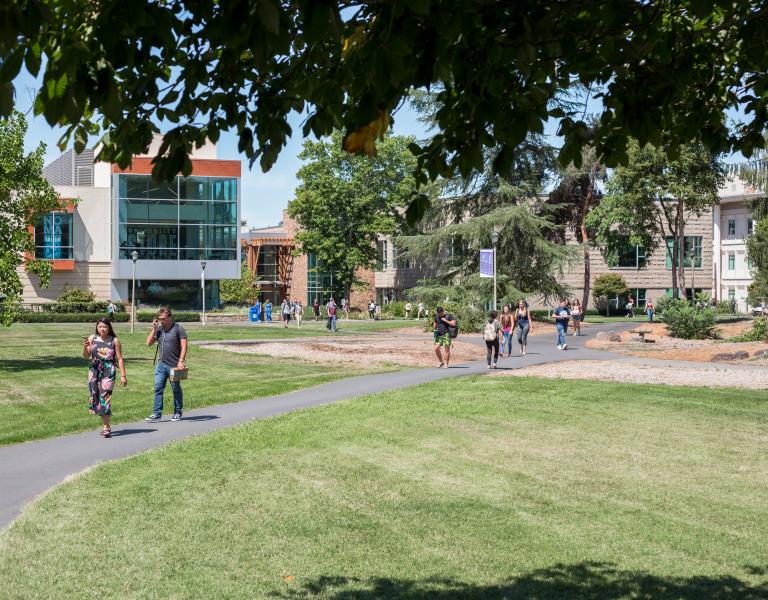Resources
Campus Resources
Health and Wellness
CAPS supports student mental health and well-being. They offer short-term individual and group counseling, workshops, crisis intervention services, consultation, referral, training, and outreach. Rociel Martinez, Psy.D. is a staff psychologist at CAPS and the liaison to the Seawolf Scholars program and CAASE. She received her PsyD in Clinical Psychology from the PGSP-Stanford Psy.D. Consortium, a joint program between Palo Alto University and Stanford University’s Psychiatry Department in the School of Medicine. She has focused her career on college mental health, and is dedicated to working with students from historically marginalized populations who have experienced: first-generation college concerns; family of origin conflicts; complex or community trauma (including sexual assault, childhood abuse, or dating violence); and multicultural and social justice issues.
The Student Health Center (SHC) provides high quality medical, public health, and health education services designed to support the retention, academic achievement and success of SSU students, facilitate healthy lifestyle choices and help promote a safe, healthy campus environment.
Campus Recreation offers many programs and services, including Group Fitness classes, and a variety of Intramurals. At the Rec, you can swim in an aquatics pool, get a bike rental or a quick fix at the Seawolf Cyclery, climb the Rock Wall, rent outdoor gear for your next adventure at the Outdoor Resource Center, sign up for an Outdoor Pursuit Trip, and so much more.
Student Life
REACH (Residential Education and Campus Housing) provides students with on-campus housing. When you live on campus you get the most out of your college experience by focusing on academics, making connections, and living in a safe learning environment. For a list of off-campus housing, please visit the website ssu.och101
Seawolf Living provides information regarding events, programs and opportunities for student engagement across campus. Follow them on Instagram @SeawolfLiving.
Student Involvement strives to enhance your experience at SSU. By getting involved you are able to make meaningful connections, expand on your skills, and find your place on campus. There is a club or organization for everyone, explore outlets ranging from academic/departmental, fraternity and sorority, multicultural, spiritual, political, social, special interest, performing arts, competitive sports clubs, and so much more!
The Associated Students of Sonoma State University is a student-run auxiliary providing programs and services to enhance the lives of students.
The HUB Cultural Center, fosters connection and meaningful conversation between students, staff, and faculty to build community within and between cultures, and across different worldviews.
Community Resources
Foster Youth Services
California Office of the Foster Care Ombudsperson (OFCO) is to advocate on behalf of foster children and youth regarding their care, placement, and services. The OFCO is an autonomous entity that is empowered to investigate and informally resolve complaints impacting foster youth, increase awareness about foster youth rights, and make recommendations to help support systemic change.
TLC Child & Family Services is a non-profit organization that annually serves over 600 children, young adults and families in Northern California. TLC provides comprehensive quality foster care and adoption services, residentially-based services, special education services, transition age youth housing and counseling.
VOICES recognizes that youth are not only recipients of social services, they are also active leaders in supporting their peers, guiding the evolving vision of program delivery at each site, conducting capacity building to enable growing numbers of social service agencies to become “youth-friendly,” and advocating to the community at large to listen and respond to youth voice. VOICES’ one-of-a-kind Youth-Engagement Model provides evidence of past experience and expertise related to developing program activities and goals. The Model focuses on empowering each youth, integrating resources and services, and working with the entire community to address the barriers that youth face as they leave systems of care.
Youth Scoop is designed by VOICES youth to help people navigate their options and eligibility in the areas of Education, Employment, Housing, Transportation, Supportive Services, and Health & Wellness. At Youth Scoop you will find resources and helpful tools for Alameda, Napa, Solano, and Sonoma counties!
Financial Resources
Education Grants & Scholarships
California Chafee Grant for Foster Youth (Chafee Grant) awards up to $5,000 a year to eligible foster youth. The Chafee Grant may be used at any eligible California college or university, or career or technical school. Students attending schools in other states may also qualify. A student's receipt of a Chafee Grant award shall not exceed five years (whether or not consecutive).
California State University students who are current or former foster youth are eligible for a variety of types of financial assistance to pay for college, including the CSU Tuition Waiver for Current and Former Foster Care Recipients. Be sure to submit a Free Application for Federal Student Aid (FAFSA) every year. And for students who may not qualify for Federal Student Aid, you may still be eligible for other aid through the California Dream Act (CADA). If you identify as an “independent student” based on your current or former foster youth status, you may be eligible for state, federal and/or university financial aid.
Seawolf Scholars program provides scholarship opportunities for matriculated students. Please contact Shelly Gomez, Seawolf Scholars Manager, for more information on how to apply.


